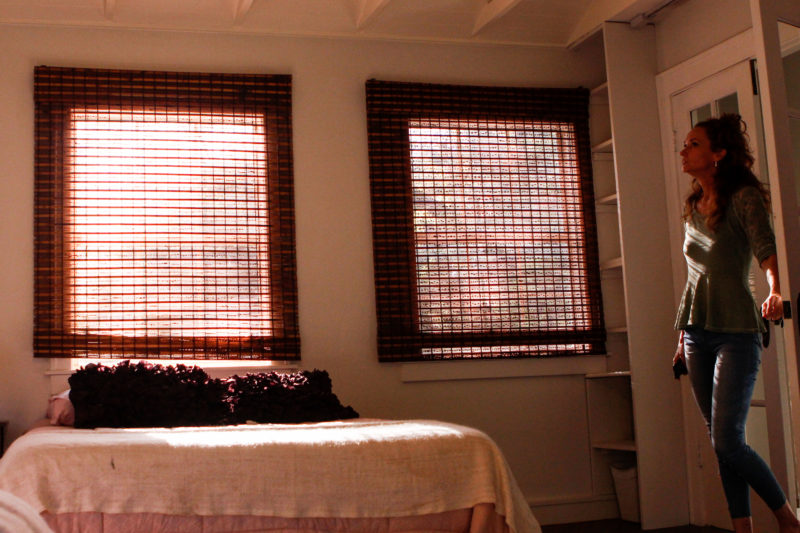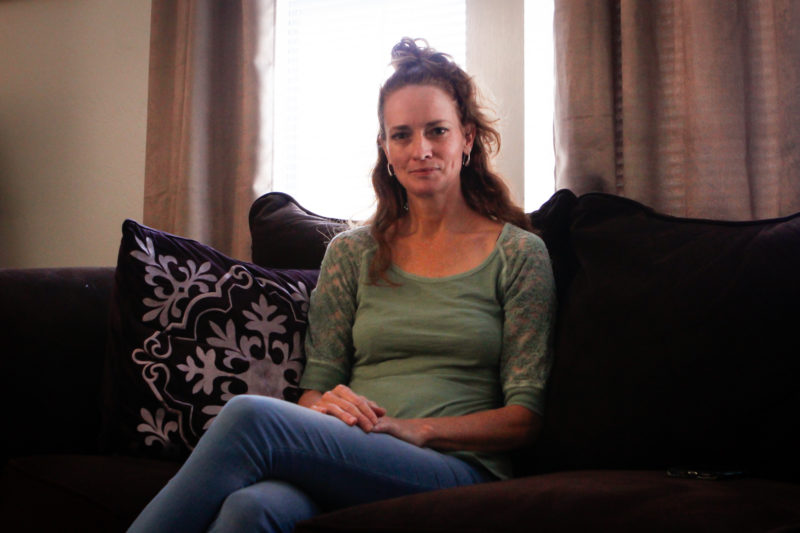Austin Clinic Helps Addiction Patients After Using Psychedelic Drug Ibogaine
By Ramón Rodríguez
Reporting Texas

Lindsey Slater White, a licensed psychotherapist and founder of Root Recovery, had her first experience with ibogaine treatment in 2011 and realized the need for aftercare. Mizelle Mayo/Reporting Texas
In 2012, Lindsey Slater White was dealing with the repercussions of a difficult divorce. After reading about ibogaine in a book about the 2012 Mayan doomsday prophecy, she traveled to Mexico and took the psychedelic drug. Ibogaine helped lift her depression and gave her insight into the root of her problems, she said.
“It just changed my life,” White, 44, said.
White, a licensed psychotherapist, started Root Recovery Aftercare in 2016. Root Recovery provides a residential aftercare program to patients as they recover after taking ibogaine to treat opioid addiction. Most clients travel to Mexico to take ibogaine — where it is legal — and then come to Root Recovery. The business has helped about 100 people recoup after ibogaine treatment, White said. In Texas, at least 1,402 people died from opioid overdoses in 2018, according to the National Institute on Drug Abuse.
“There was a stated need in the ibogaine community for an aftercare facility that was therapy-based and not just a renegade version of aftercare,” White says.
Ibogaine is derived from the root of the iboga tree, which is native to West Africa but can be grown in tropical climates such as Central America. The drug has been part of the wave of psychedelics being used for medical purposes in the last decade — including psilocybin and MDMA.
The U.S. Drug Enforcement Administration lists ibogaine as a Schedule I substance, or a drug with “no currently accepted medical use and a high potential for abuse,” such as heroin or marijuana. That status has made large-sample studies difficult to conduct, a 14-person study from 2018 in New Zealand reported ibogaine usage resulted in 75% opioid abstinence over 12 months. The results suggest ibogaine may have more efficacy than the commonly used opioid addiction medication Suboxone.
Root Recovery does not administer ibogaine and does not refer patients to clinics that administer the drug, which is illegal in the United States. White calls the setup “an experimental model” that enables her to avoid state involvement. The business is headquartered in a West Austin home and is classified by the state as a group home or therapeutic retreat, not a rehabilitation center.
A stay at Root Recovery costs about $11,000 a month. A typical day includes macrobiotic breakfast, off-site talk therapy, hikes and yoga. Root Recovery also offers breath work, cryotherapy and Kambo, a process in which the poisonous, non-psychoactive skin secretion of the giant monkey frog is applied to small purposely inflicted burn wounds. Kambo purportedly helps with residual withdrawal symptoms from opioids, though no scientific evidence backs up the claim.

Lindsey Slater White is a licensed psychotherapist and owner of Root Recovery in Austin. Mizelle Mayo/Reporting Texas
Using a drug to treat addiction to drugs may seem counterintuitive. Many recovery models insist on total abstinence. Austin resident Ray Rodriguez, 46, used to hold the same belief. Rodriguez, a transformational recovery coach at Root Recovery, kicked a 20-year opioid addiction in 2014 by following a traditional 12-step program.
Around his third year of sobriety, he felt he was hurtling towards a relapse. He went to Mexico to smoke the venom of the Sonoran Desert toad, which contains the powerful psychedelic compound 5-MeO-DMT and is said to have similar effects to ibogaine. He had heard that the compound could help keep addiction at bay.
Rodriguez credited this experience with saving his life, though he compared the venom’s taste to guano and said iboga bark tasted even worse.
Most ibogaine experiences follow a format. A patient goes to a country where it is legal and is given an oral dose of 800 to 1,600 mg. Soon after ingestion, users have visual and aural hallucinations. They then enter a dream-like stage lasting 4-8 hours, described by many as like watching a film. Then the crux of the experience starts: a period of intense introspection described by those who have done it as facing all of one’s traumas at once.
There are health concerns with ibogaine. At high doses,the drug has been shown to cause brain damage in rats, and between 1990 and 2008, 19 people who used ibogaine died from seizures, heart failure or interaction with other drugs, according to a study done by New York University professor and psychiatrist Dr. Kenneth Alper.
Mark Kinzly, founder of the Texas Overdose Naloxone Initiative — which works to distribute Narcan, a medication that reverses opioid overdoses, blames ibogaine’s prohibition on the perception that western medicine is the only type of treatment taken seriously by the public.
“With all the evidence and all the successes, we still refuse to utilize it. It doesn’t make sense.” Kinzly said.
Dr. Deborah Mash is a professor of neurology at the University of Miami and founder of DemeRx, a pharmaceutical company developing ibogaine for single-use addiction treatment. Mash has dedicated 25 years to researching ibogaine.
Mash loathes non-medical professionals who administer ibogaine in underground settings, she said. She has heard stories of people dying from ibogaine in such settings. “You want to know what the obstacle is for advancing ibogaine? It’s that! It’s the vast underground experiment,” Mash said.
She castigated what she sees as Root Recovery’s lack of transparency on the internet — there is no explicit mention of ibogaine on the organization’s websites. White declined to comment on Mash’s criticism.
Both Mash and White agree on one thing — the current treatment of addiction in the U.S. needs fixing.
Before opening Root Recovery, White worked primarily with teenagers struggling with substance abuse — in hospitals, residential treatment centers and her private practice. She said low success rates frustrated her. Ibogaine could help the situation,if only more people would use it, she said.
“[Ibogaine] takes you to what you need,” White said.